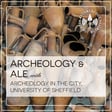
Teaching and Training in Archaeology: a historical perspective with John Collis - Ep 41
Archaeology & Ale is a monthly series of talks presented by Archaeology in the City, part of the University of Sheffield Archaeology Department’s outreach programme. This month we are proud to host John R. Collis from the University of Sheffield speaking on "Teaching and Training in Archaeology: a Historical Perspective with John Collis." This talk took place on Wednesday, June 30th, 2021, online via Google Meets.
John Collis, the University of Sheffield
John Collis studied archaeology in Cambridge in the 1960s, but also briefly in Prague, Tübingen and Frankfurt. He was an advisor at the research centre in Mont Beuvray in Burgundy for 17 years, and led excavations and field work in the Auvergne and in central Spain as well as England. He lectured in Sheffield from 1972 to 2005 and was one of the founding members of the department in 1975. He lectured on the European and the British Iron Age, and is mainly known for his writings on the Iron Age, urbanisation and the problems of the Celts. He also lectured on excavation techniques, and wrote Digging up the Past based on his lectures. However he was also writing about the training of archaeologists, and was chair of the Teaching and Training Committee of the Chartered Institute of Archaeologists (of which he was as a founding member), and helped introduce Continuing Professional Development (CPD) for archaeologists. He also set up the Teaching Committee of the European Association of Archaeologists to discuss the impact of the ‘Bologna’ structure on university degree courses and its impact on archaeology. He was advisor to the first European ‘Profiling the Profession’ led by Kenny Aitchison. He has written several articles on the ways in which training is given and different European traditions of teaching, digging and defining archaeologists.
For more information about Archaeology in the City’s events and opportunities to get involved, please email archaeologyinthecity@sheffield.ac.uk or visit our website at archinthecity.wordpress.com. You can also find us on Twitter (@archinthecity), Instagram (@archaeointhecity), or Facebook (@archinthecity)
ArchPodNet- APN Website: https://www.archpodnet.com
- APN on Facebook: https://www.facebook.com/archpodnet
- APN on Twitter: https://www.twitter.com/archpodnet
- APN on Instagram: https://www.instagram.com/archpodnet
- Tee Public Store
